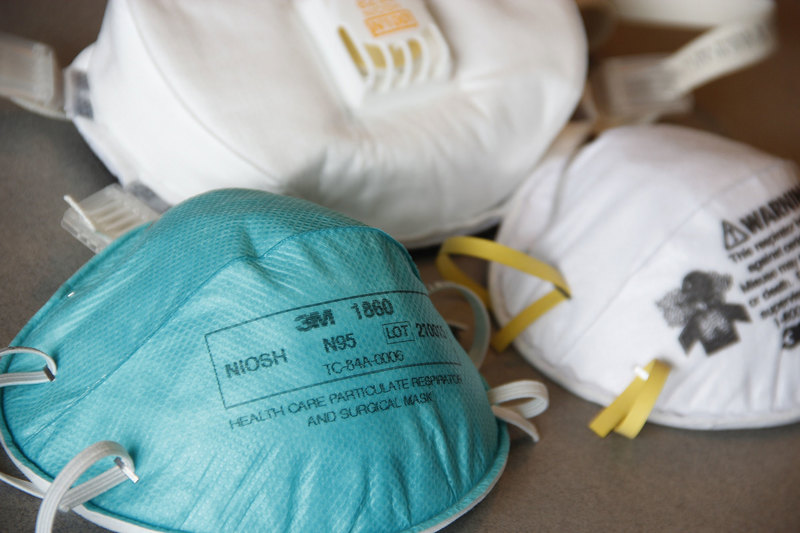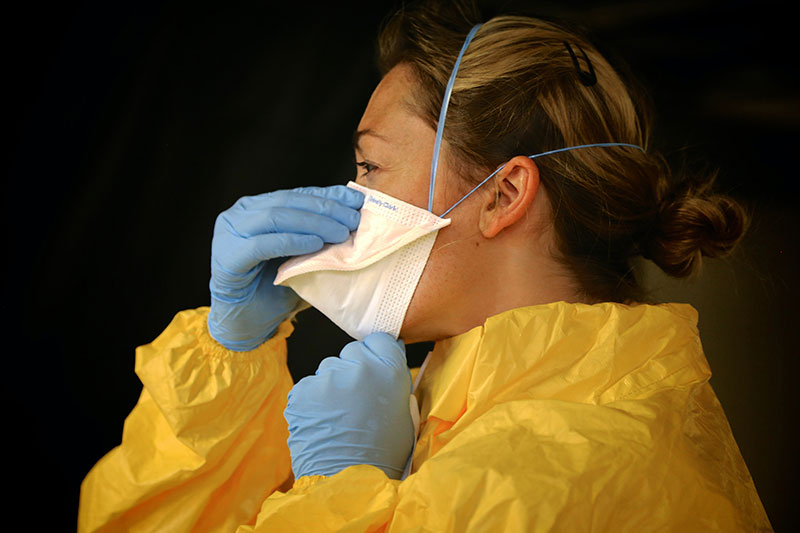UCT alum innovates again to keep PPE ‘InSupply’
22 May 2020 | Story Carla Bernardo. Photos Pexels. Read time 4 min.
University of Cape Town (UCT) alumnus and co-founder of Coronapp, Tamir Shklaz, has yet again responded to the challenges of the pandemic – this time by facilitating the buying and selling of much-needed personal protective equipment (PPE) in South Africa.
Less than a month after the launch of Coronapp, which he co-founded with UCT mechanical engineering graduate Wisani Shilumani, Shklaz has built InSupply, a centralised marketplace that connects those who have PPE to those who need it most.
The platform was created at the beginning of May and has already registered more than 500 suppliers, 50 million PPE items, and over 200 organisations wanting to purchase PPE.
When Shklaz came up with the idea of InSupply, it was in response to OfferZen’s Unlockdown challenge. The challenge, which is supported by the South African government, calls on the nation’s technology industry to mobilise and assist in combating the impact of COVID-19.
It didn’t take long for a group of investors to see the potential of the project, and it has since evolved into its current iteration: to connect trusted, verified sellers of PPE to trusted, verified buyers who are on the frontline of the nation’s response to the pandemic.
Investors include WeThinkCode’s co-founder and tech entrepreneur, Yossi Hasson, and Justin Drennan, the founder of Parcelninja. InSupply already has its first employees: five young people, including UCT student Sama Naraghi. These young innovators are helping to grow the company into one that will operate beyond the pandemic.
Problems, solutions
Shklaz identified four distinct problems with PPE supply and getting it to the frontline.
The first is the existing supply chain. Before COVID-19, hospitals would typically use one or two suppliers who would source PPE as and when needed. With the pandemic, suppliers are running out of stock and are unable to replenish it in time. Companies who would ordinarily not need PPE are also adding to the demand, applying further pressure on the supply chain.
There is also the lack of trust that comes with buyers needing to find new suppliers. They often have limited resources, such as time and people who conduct the vetting process.
The third problem is price gouging, which means many healthcare workers are unable to afford PPE.
Lastly, faulty goods are being sold that lack certification and rarely meet the required specifications.

With InSupply, the UCT graduate is providing solutions. First, suppliers undergo a strict vetting process to ensure their legitimacy. Buyers are also vetted to ensure they are legitimate users of PPE and are in genuine need of the products.
Secondly, InSupply provides transparency by enabling buyers to view and compare the prices of PPE, which helps negate price gouging and encourages suppliers to offer competitive rates.
Finally, InSupply is connecting frontline workers directly to the supplier, thereby cutting out the “middleman”.
The demand
Since launching InSupply less than a month ago, Shklaz is already able to list the most in-demand PPE from the 50 million items registered on the site. With the global shortage of active filtration masks, masks such as the 3M N95, KN95 and FFP2 are the most requested items, followed by booties, scrub gowns and other masks.
The greatest demand comes from major urban areas like Cape Town, Johannesburg and Durban. But through his work with the Southern African HIV Clinicians Society (SAHCS), Shklaz has been alerted to the needs of doctors in rural parts of the country who also lack the required PPE and fall out of the ambit of public hospitals that are sufficiently covered by the government.
Next steps
To stay abreast of how best to apply his skills and respond to the critical need for PPE, Shklaz is currently in conversation with numerous organisations and projects, locally and abroad.
To help InSupply operate on a nationwide basis, he is also working with SAHCS, Business for SA and the South African Health Products Regulatory Authority. To learn from peers, Shklaz is in contact with ProjectN95, a United States-based organisation that inspired InSupply, and another US-based project, #GetUsPPE.
Going forward, the goal of InSupply is to revolutionise the way supply chain works in South Africa. Included in the plans are support for escrow payments and large-scale logistics and transportation of equipment across the country.
Shklaz is also interested in creating a platform to facilitate the distribution of PPE donations to those who cannot afford it and are in need. To do so, he will continue to engage with SAHCS and other relevant parties.
The UCT alum is also looking to assist manufacturers who are repurposing their production lines to produce PPE equipment. He aims to provide these manufacturers “with an ecosystem of support to ensure their PPE equipment meets South African standards and connect them with buyers across the country”.
 This work is licensed under a Creative Commons Attribution-NoDerivatives 4.0 International License.
This work is licensed under a Creative Commons Attribution-NoDerivatives 4.0 International License.
Please view the republishing articles page for more information.
UCT’s response to COVID-19
COVID-19 is a global pandemic that caused President Cyril Ramaphosa to declare a national disaster in South Africa on 15 March 2020 and to implement a national lockdown from 26 March 2020. UCT is taking the threat of infection in our university community extremely seriously, and this page will be updated with the latest COVID-19 information. Please note that the information on this page is subject to change depending on current lockdown regulations.
Minister of Health, Dr Joe Phaahla, has in June 2022 repealed some of South Africa’s remaining COVID-19 regulations: namely, sections 16A, 16B and 16C of the Regulations Relating to the Surveillance and the Control of Notifiable Medical Conditions under the National Health Act. We are now no longer required to wear masks or limit gatherings. Venue restrictions and checks for travellers coming into South Africa have now also been removed.
Read the latest document available on the UCT policies web page.
Campus communications
2022
UCT Community of Hope Vaccination Centre
On Wednesday, 20 July, staff from the University of Cape Town’s (UCT) Faculty of Health Sciences came together with representatives from the Western Cape Government at the UCT Community of Hope Vaccination Centre at Forest Hill Residence to acknowledge the centre’s significance in the fight against COVID-19 and to thank its staff for their contributions. The centre opened on 1 September 2021 with the aim of providing quality vaccination services to UCT staff, students and the nearby communities, as well as to create an opportunity for medical students from the Faculty of Health Sciences to gain practical public health skills. The vaccination centre ceased operations on Friday, 29 July 2022.
With the closure of the UCT Community of Hope Vaccination Centre, if you still require access to a COVID-19 vaccination site please visit the CovidComms SA website to find an alternative.
“After almost a year of operation, the University of Cape Town’s (UCT) Community of Hope Vaccination Centre, located at the Forest Hill residence complex in Mowbray, will close on Friday, 29 July 2022. I am extremely grateful and proud of all staff, students and everyone involved in this important project.”
– Vice-Chancellor Prof Mamokgethi PhakengWith the closure of the UCT Community of Hope Vaccination Centre, if you still require access to a COVID-19 vaccination site please visit the CovidComms SA website to find an alternative.
Frequently asked questions
Global Citizen Asks: Are COVID-19 Vaccines Safe & Effective?
UCT’s Institute of Infectious Disease and Molecular Medicine (IDM) collaborated with Global Citizen, speaking to trusted experts to dispel vaccine misinformation.
If you have further questions about the COVID-19 vaccine check out the FAQ produced by the Desmond Tutu Health Foundation (DTHF). The DTHF has developed a dedicated chat function where you can ask your vaccine-related questions on the bottom right hand corner of the website.
IDM YouTube channel | IDM website
“As a contact university, we look forward to readjusting our undergraduate and postgraduate programmes in 2023 as the COVID-19 regulations have been repealed.”
– Prof Harsha Kathard, Acting Deputy Vice-Chancellor: Teaching and Learning
We are continuing to monitor the situation and we will be updating the UCT community regularly – as and when there are further updates. If you are concerned or need more information, students can contact the Student Wellness Service on 021 650 5620 or 021 650 1271 (after hours), while staff can contact 021 650 5685.




















